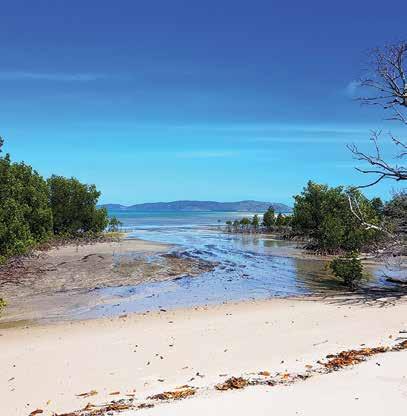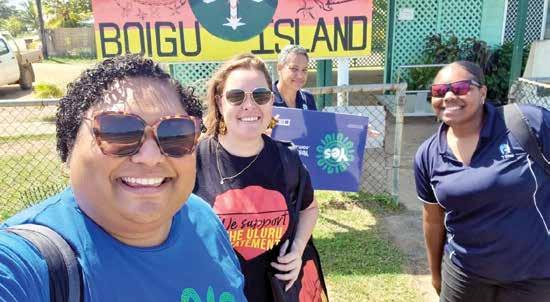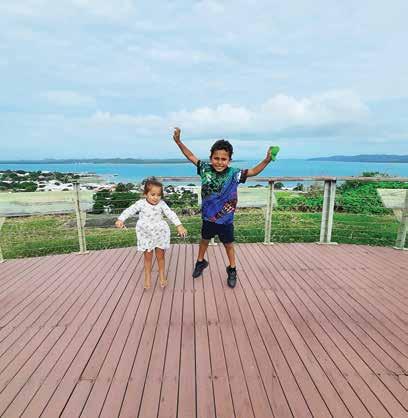
3 minute read
Call for Indigenous voices to lead Australian response to climate crisis
Australia must address historic and contemporary systemic racism to better tackle the climate crisis – that was one of the key conclusions of a paper recently published in a special edition of the international publication, Science, which examined Australia’s environmental challenges.
The paper, co-written by leading Australian Aboriginal and Torres Strait Islander health research organisations, said Indigenous people held the knowledge to reform our relationship to the environment.
Authors included researchers from the University of Sydney, University Centre for Rural Health (UCRH), the Healthy Environments And Lives (HEAL) network, and the Lowitja Institute.
They said current Australian laws and policies limited the application of Indigenous knowledge for improved climate change mitigation and adaptation.
The review examined existing studies on Indigenous-led climate and health relationships and built on the work of a 2021 national roundtable discussion on climate change and Aboriginal and Torres Strait Islander health, centred on the voices of Indigenous community leaders and advocates.
University of Sydney Leading UCRH researcher and Co-Lead Investigator for the CRE-STRIDE Network, Associate Professor Veronica Matthews said the paper highlighted the need to undo historical legacies of colonisation for the benefit of a healthier future.
“We already know how important it is to listen to and work with Aboriginal and Torres Strait Islander communities for placebased solutions around health outcomes,”
Associate Professor Matthews said.
“What health and climate researchers are exploring now is how the same principle applies to climate change.
“The planet’s ill health has largely come about because humans have forgotten their relationship and responsibility to Country.
“Imagine if we could tap into the way First Nations cultures focus on deep, holistic connections to the environment to help us rethink environmental and health policies.”
Director of the HEAL network Professor Sotiris Vardoulakis said climate change provided an immediate opportunity to weave together Aboriginal and Torres Strait Islander and Western science to better inform government policy and direction around climate change action.
“We need to embrace diverse knowledge systems and be open to different perspectives,” he said.
“The reality is that tapping into Indigenous ways of holistic thinking will require different approaches to research and policymaking.”
A key point made in the paper was the need to address power structures and provide Aboriginal and Torres Strait Islander communities equitable governance over their traditional lands.
After this was achieved, communities could revitalise and strengthen cultural practices that protect Country and simultaneously build respectful collaborations around climate change and planetary health for the benefit of all.
Lowitja Institute CEO, Adjunct Professor Janine Mohamed said the collaboration reflected the seriousness, not only of climate change, but also the significance of the upcoming Australian referendum which, if successful, would enshrine an Aboriginal and Torres Strait Islander Voice in the Australian Constitution.
“A Voice to the Australian Parliament, we believe, will unlock the wisdom held by Aboriginal and Torres Strait Islander people that could help us tackle very real environmental issues,” Adjunct Professor Mohamed said.
“Australian Indigenous communities have adapted their ecological knowledge over millennia, yet our work shows this enormous well of knowledge is being overlooked.”
The paper concluded that in the Australian context an important first step in shifting policy processes to embed genuine and open engagement with Aboriginal and Torres Strait Islander communities would be a successful referendum on the Voice.

“We have a long way to go in redressing past wrongs and embracing the strengths of Aboriginal and Torres Strait Islander culture,” Professor Vardoulakis said.
Each week we will publish a pic showing the Ailan way of life in the Torres Strait and the NPA – the kids swimming, a BBQ at the beach, fishing, scenic shot, etc – from local photographers and readers across our region. Just email us your pic of Ailan Life along with your name, phone number and a 25-word description to ads@torres.news
This week’s pics were submitted by Myra Seeto and Lazariah Nona.
ABOVE: Myra’s pic was taken from Wednesday Island, looking back to Keriri Island. “Endless beauty,” said Myra.
BELOW: Lazariah’s pic of her children, Victor and Mikaela Gibson-Nona, was taken on Thursday Island.
“I left my home on Badu Island 11 years ago to upskill and pursue a career that would help my people, no kids, no partner. Now, I return with my family to give back to my people. I am excited that they now get to learn their culture, language, lore’s and practices. What a beautiful place that we now call home – TI,” Lazariah said. Myra and Lazariah are now in the draw to win this month’s $150 gift card! Good luck!




